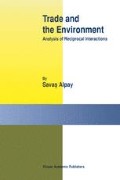Abstract
Global environment is subject to two adverse externalities. Transnational environmental degradation, a type of negative externality, imposes certain costs not only on the originating country but also on the other countries (ozone-layer depletion is a good example of this). On the other hand, policies aimed to tackle transnational environmental degradation, involve positive externality from which all countries benefit regardless of their taking action. As a result, countries leave it to others to take pro-environmental actions, and this may result in under-production (if not zero) of environmental good. Thus, as in the public good case, global environmental protection is subject to free-riding. In this chapter, we will present the interactions between trade and environment in the context of international environmental agreements with special attention to international trade regime, trade-environment disputes, and free-riding incentives on global environmental protection.
Access this chapter
Tax calculation will be finalised at checkout
Purchases are for personal use only
Preview
Unable to display preview. Download preview PDF.
Notes
In an earlier literature, there has been put some doubt on the importance and the existence of the free rider problem. Explicitly, we can cite Bohm (1972), Sweeney (1973), and Smith (1979), who designed experiments which resulted in negligible free-riding when the agents had strong incentives to free ride. Nevertheless, Kim and Walker (1984) suggested that there were some’ invalidating factors’ in these previous experiments and by removing these factors in their experiment, they found out that, in fact, free-riding was substantial.
First principle requires that like products from different countries must be treated equally; second one applies the same rule to imported products versus domestic products; third one mandates that all non-tariff barriers, quotas, bans, etc., be converted to tariffs; and the last principle requires parties to try to settle their trade disputes through consultation and negotiation. See, for example, Esty (1994).
For full text of NAFTA, one can see http://www.dfait-maeci.gc.ca/nafta-alena/agree-e.asp.
This book is available at http://www.cec.org/pubs_docs/scope/index.cfm?varlan=english&ID=14.
At least those with transnational feature.
More on this protocol below.
Note that this enforcement policy through trade barriers could be challenged under GATT regulations by non-member countries; however, most members of the GATT are also members of the Montreal Protocol, so such challenges need not diminish the effectiveness of this enforcement policy. Trade works for environment here.
See Goodstein(1995).
See the web site http://www.wto.org/english/tratop_e/envir_e/tr_envbadoc.htm.
We will only summarize the eight out of the twelve cases mentioned. The distinction is based on whether the disputes have been based on articles XX-b and XX-g, which provide explicit provisions for environmental protection. Following passages are taken from http://www.wto.org/english/tratop_e/envir_e/tr-envbadoc.htm.
Author information
Authors and Affiliations
Rights and permissions
Copyright information
© 2002 Springer Science+Business Media Dordrecht
About this chapter
Cite this chapter
Alpay, S. (2002). International Environmental Agreements and Trade. In: Trade and The Environment. Springer, Boston, MA. https://doi.org/10.1007/978-1-4615-0271-5_12
Download citation
DOI: https://doi.org/10.1007/978-1-4615-0271-5_12
Publisher Name: Springer, Boston, MA
Print ISBN: 978-1-4613-4997-6
Online ISBN: 978-1-4615-0271-5
eBook Packages: Springer Book Archive

